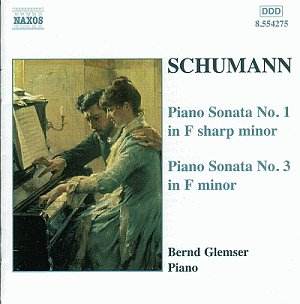Schumannís three Piano Sonatas are all, in some way,
intimately connected to his relationship with Clara Wieck. As a result,
they are all highly charged, passionate works that have unfortunately
been over-shadowed by his later, possibly more accessible pieces. That
having been said, at least one, the First, has enjoyed the advocacy
of some of the finest musicians of the day (Perahia, Kissin, Pollini,
Lupu), and one of the best piano discs in my own collection is a stunning
version by Leif Ove Andsnes (EMI, coupled with the C major Fantasy)
that provided a fascinating comparison for this excellent Naxos recital.
Glemser has already recorded the G minor Second Sonata
for Naxos (coupled with miscellaneous Schumann items) so this completes
the triptych. He is a very considerable player, as can be heard on a
number of Naxos discs Ė I think particularly of his Rachmaninov Concertos
and Prokofiev Sonatas. His temperament is well suited to the Romantics,
and the very opening of the First Sonata confirms his credentials. The
restless left-hand triplet figure, over which the introductory theme
emerges, is paced very well, just the right amount of rubato letting
the line Ďbreatheí. Andsnes is not afraid to create even more anticipation
here, but Glemserís Ďsaferí approach has its rewards. When the first
subject bursts in (around 2í26) one is genuinely plunged into Schumannís
turbulently volatile imagination. I have always loved Andsnesís shaping
of the glorious second subject (a coded love letter to Clara) but Glemser,
whilst playing it straight, is refreshingly direct and unsentimental.
His technique is fully up to the demands of the quicksilver Scherzo,
though I miss Andsnesís forthright touch in the contrasting intermezzo
section, where Schumannís marking of ma pomposo is fully observed.
Glemser is convincing in the muscular finale, where contrasting ideas
battle for supremacy, and the virtuosic Paganinian coda shows this artist
at thrillingly full stretch.
The Third Sonata, spuriously titled Concert
sans orchestre by a publisher, has fared a lot less well than the
other two. The structure is slightly less well defined, though the imaginative
flights are at least as alluring. Glemser certainly makes a strong case,
giving plenty of forward propulsion to the diverse material on offer.
The variation third movement is the key, where Eusebius (the reflective
poet of the composerís imagination) makes his first real appearance.
Glemser beautifully shapes the passionato third variation (2í31)
where Schumann interweaves strands of music associated with himself
and Clara into ever more complex and impassioned textures. This is,
all in all, a very satisfying performance of a piece virtually forgotten
today.
Recording quality is excellent, full-bodied and bright,
with the well voiced piano nicely caught. Helpful notes are by the ever-reliable
Keith Anderson. I doubt if Naxos have anything to fear from the illustrious
competition, and anyone spending their hard-earned fiver on this issue
will not be disappointed.
Tony Haywood
Also see review
by Kevin Sutton


